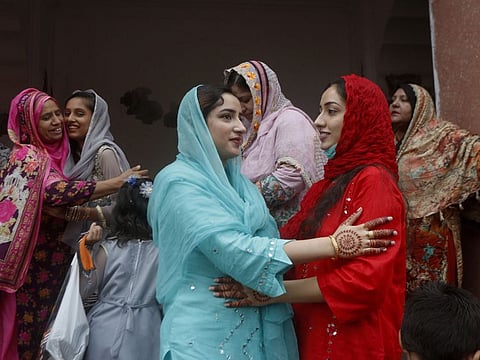The silent strength: How Pakistani women keep pushing boundaries
Despite barriers in society, women are stepping into roles once closed to them

The story of Pakistan’s evolution is deeply interwoven with the silent but significant role played by its women. Though the formal societal structures have always been male-dominated, women have contributed at every critical juncture in the country’s history — seldom in the spotlight.
At the time of Pakistan’s independence, women stood shoulder to shoulder with men in the struggle for a separate homeland. Fatima Jinnah’s public presence lent moral legitimacy to Muhammad Ali Jinnah’s vision and became a source of pride and inspiration for women in a deeply conservative society. Ra’ana Liaquat Ali Khan, wife of Pakistan’s first prime minister did pioneer work towards women’s empowerment. Despite these contributions, post-independence Pakistan quickly regressed to confining women largely to the private sphere.
It took decades for women to break through institutional barriers. The 1970s under Zulfikar Ali Bhutto marked the first significant, if incomplete, shift. Women were inducted into the civil service in greater numbers, and the establishment of women’s universities opened new spaces. The 1980s saw regression under General Zia’s Islamisation policies, but ironically, it also catalysed feminist resistance and activism that has sustained to this day. Under General Musharraf, another military ruler, legal reforms and quotas in local governments provided women a tentative political foothold. Yet, these openings remain sporadic and often contingent on the will of the ruling elite rather than any organic societal transformation.
Advance against stiff resistance
In today’s Pakistan, women continue to advance, but unevenly and often against stiff resistance. According to the World Economic Forum’s 2024 Global Gender Gap Report, Pakistan ranks 145 out of 146 countries — a grim reminder of how far the country lags. Female literacy hovers around 48% nationally, but this figure hides vast regional disparities. While female literacy in urban Punjab or Karachi may exceed 70%, in rural Balochistan and parts of Khyber Pakhtunkhwa, it remains below 20%. Access to higher education has improved, yet the outcomes are paradoxical. Many young women earn professional degrees — especially in medicine — but only a fraction join the workforce. Of the roughly 70,000 doctors trained over the last two decades, over half never practiced, sidelined by marriage or social restrictions.
This phenomenon — of education serving as social capital for matchmaking rather than professional advancement — underscores the deeply patriarchal underpinnings of society. A good degree is often seen, not as a step toward career-building, but as a passport to a better marriage proposal.
Lack of a support structure however, disallows educated women to convert their qualifications into careers. Pakistan’s female labour force participation is a meagre 21%, among the lowest in South Asia, and many employed women are in low-paid, informal work.
Still, women have made notable inroads into public life. They now serve in the judiciary, bureaucracy, academia, media, and private enterprise. Women-owned businesses are rising, particularly in urban centres. The number of women in Pakistan’s civil services has grown, though they often remain underrepresented in higher echelons. Women also remain active in civil society, running NGOs, leading advocacy on human rights, and spearheading education and health initiatives in underserved areas.
Mixed bag in politics
Politics, however, remains a mixed bag. Pakistan was the first Muslim-majority country to elect a woman as prime minister. Yet the rise of Benazir Bhutto was enabled by dynastic politics, and her legacy did little to dent patriarchal party structures. Reserved seats have ensured a minimum female presence in legislatures, but very few women are elected to general seats or hold significant positions in mainstream parties. Politics continues to be a male preserve, often built around familial patronage networks where women play decorative roles.
Ironically, Imran Khan — despite leading a party with limited female leadership — commands unusually high support among urban women. Many women activists have been imprisoned or harassed for their vocal backing of Khan, including some with no political background. This paradox reflects the vacuum in mainstream politics for credible female representation and the yearning for leadership that resonates beyond traditional patronage.
Women in public life
What is clear is that Pakistan’s deeply patriarchal society continues to limit women’s participation in public life. Sexual harassment, mobility restrictions, forced marriages, and honour-based violence remain widespread. Even legal protections — where they exist — are poorly enforced. The regression of the past two decades, marked by rising religious conservatism and shrinking civic space, has reversed many gains. The backlash against the Aurat Marches is illustrative of a society unwilling to even hear women’s voices demanding autonomy.
The road ahead is steep. Empowerment cannot be achieved merely through legislation or token representation. It requires cultural change — within families, educational institutions, workplaces, and religious institutions. It also demands political will, which remains conspicuously absent. Until women are seen not as dependents or symbols of honour, but as full citizens entitled to equal rights and opportunities, Pakistan’s development will remain partial and stunted.
As we approach eight decades since independence, it is time to recognise that the liberation of women is not a women’s issue — it is a national imperative. The future of Pakistan depends not just on how its men lead, but on how far its women are allowed to rise.
Sajjad Ashraf served as an adjunct professor at the Lee Kuan Yew School of Public Policy, National University of Singapore from 2009 to 2017. He was a member of the Pakistan Foreign Service from 1973 to 2008 and served as a ambassador to several countries.







